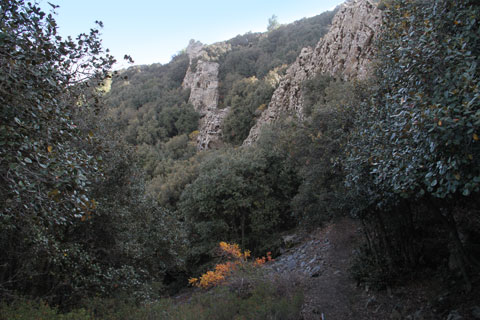|
Teichia tis Madaris Geo-Trail
Length
|
3km - circular
|
Duration
|
1,5 - 2 hours
|
Degree of Difficulty
|
2
|
Highest - Lowest Altitude
|
1550m- 1400m
|
General Description
|
Some changes of gradient (uphill/downhill)
|
Starting Point
|
End of the Madari no-through-road near the Department of Forests’ fire lookout station
|
Most suitable period
|
End March - April
|
Points to watch
|
Don’t stand for too long under overhanging rocks
|
Drinking water en route
|
No
|
DESCRIPTION OF THE ROUTE
If you choose the starting point near the fire lookout station, the trail is narrow at first and on hard diabase but after 200 metres it becomes regular.  There are some short changes of gradient (uphill/downhill), which are not particularly tiring, and in some places there are steps and a number of dry stone walls built in 1993 when the Trail was laid out. You will also find stopping places with benches and viewing points, the first just 300 metres from the start. There are some short changes of gradient (uphill/downhill), which are not particularly tiring, and in some places there are steps and a number of dry stone walls built in 1993 when the Trail was laid out. You will also find stopping places with benches and viewing points, the first just 300 metres from the start.
The route offers a panoramic view of Troodos, the lower areas of Solia, the Mesaoria Plain and, in the foreground, the villages of Kannavia, Agia Eirini, Lagoudera and Polystipos, the Xyliatos Dam and finally the Pitsilia region and the Limassol district. The Trail is located within the Adelphi Forest in a section that has been incorporated into the Madari-Papoutsa Natura 2000 area. The Teicha tis Madaris Nature Trail joins the Madari-Doxa Soi o Theos and Madari-Selladi Karamanli Trails at the starting point. The vegetation in the area is more reminiscent of the Troodos Forest since they share many aspects. There are, however, others that are unique to Madari.
VEGETATION AND FLORA
The most common elements of vegetation are the Golden Oak (Quercus alnifolia), Calabrian Pine (Pinus brutia) and the rare Greek Juniper (Juniperus excelsa). Also, there are wild roses (Rosa canina – Rosa chionistrae), Cotoneaster (Cotoneaster nummularia), the rare Oriental Hackberry (Celtis tournefortii), Whitebeam (Sorbus aria), the Cretan Barberry (Berberis cretica), the endemic Holmboe (Nepeta troodi), the rare Wild Peony (Paeonia mascula) which blooms at the end of March / beginning of April on the northern slopes, and others.
GEOLOGY
Along the entire route around the Teichia tis Madaris there are intrusives and one of the most impressive instances of the Sheeted Dyke Complex. The rocks here consist mainly of diabase and microgabbro due to the low level of transformation that they underwent due to the effect of hydrothermal fluids at temperatures of 350°C. The most remarkable aspect of the geology of the area lies in the almost vertical rocks (Teichia) projecting majestically like enormous walls cut into the rock face along the whole route. These vertical rocks are not a manmade phenomenon but represent the most durable part in the process of erosion that has been going on for millions of years.
SERVICES
Services are available in the nearby villages of Chandria and Lagoudera which are home to a number of small tavernas where you can rest and enjoy a taste of traditional Cypriot cuisine. If you decide to stay on a little longer in the cool climate of Cyprus’ mountainous areas, the most suitable places to stay are to be found in the village of Agros.
| Best practices for walkers: |
- Stay on the signposted paths on the nature trails so as to reduce the risk of treading on small plants and saplings.
- Avoid smoking and eating when walking on the nature trails.
- Don’t make unnecessary noise. Respect the peace and quiet of others and enjoy the sounds of nature.
- Place your rubbish in the available waste bins or, better still, take it with you.
- Make use of the special camping areas with facilities for visitors.
- Don’t cut the branches of trees or shrubs; don’t cut or uproot plants; don’t carve tree bark.
- It is forbidden to ride motorcycles or bicycles on the nature trails.
- The lighting of fires in any area of the forest, even on roads and in squares, is strictly forbidden. Fires are allowed ONLY in specific areas for barbecues.
- Call the Department of Forests on 1407 (Freephone, 24 hours a day) if you see fire or smoke.
- Remember that we are all guests in the forest. Respect the wildlife of the forest and enjoy the pleasure it offers in a responsible manner.
|
|